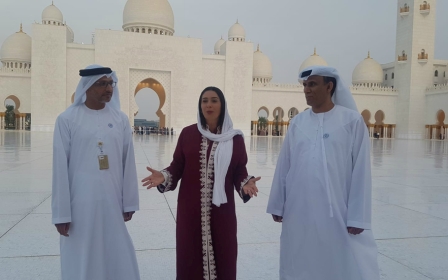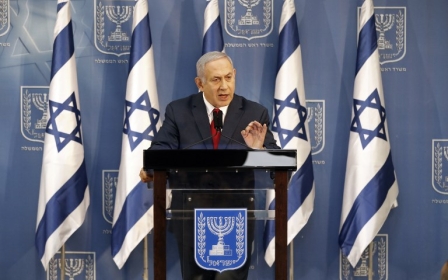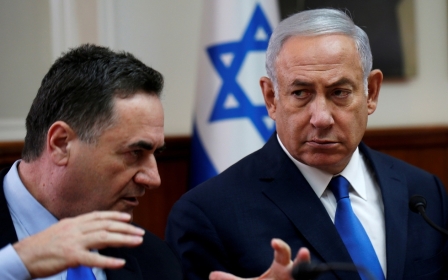Israel's Benjamin Netanyahu says he will visit more Arab states soon
Benjamin Netanyahu has said he expects to make more trips to Arab countries in the near future, after making a surprise visit to Oman last month.
The Israeli prime minister made the comments during a visit by the president of Chad, Idriss Deby, in Jerusalem on Sunday.
Deby's trip was the first official visit by a leader of the Central African country after it severed diplomatic ties with Israel in 1972.
"We discussed ... the great changes that are taking place in the Arab world in its relations with Israel," Netanyahu said, adding that there will be more visits to Arab countries very soon, though he did not name any specific countries.
Israel currently has diplomatic ties with only two Arab states, Egypt and Jordan, though Netanyahu has hinted at warmer relations with Gulf Arab countries that Israel views as allies against regional powerhouse Iran.
Netanyahu and his ministers have visited a number of Gulf states in recent weeks, including Oman and the United Arab Emirates.
Outreach to Africa
The Netanyahu government has also been investing in outreach to African countries, some of which have kept their distance from Israel since its occupation of the Palestinian territories in the 1967 Middle East war. Israel has diplomatic ties with 32 of the continent's 54 countries.
Deby said his visit was "historic" for both countries and that it "could facilitate the turning of a new page in relations between us," but added that even with a renewal of ties, the Israeli-Palestinian conflict could not be ignored.
"Of course, the renewal of diplomatic ties between us, which I very much want, is not something that can make the Palestinian issue disappear," Deby said in French through a translator.
Unofficial contacts between Israel and Chad have been ongoing for an extended period, Deby said.
One source told Reuters that the visit is focused on security, adding that Israel has supplied Chad's army with weapons and other equipment this year to help in its fight against rebels.
Deby, 66, has been in power since 1990 and has been an ally of the West in a fight against militants in West Africa. However, impoverished Chad itself faces destabilising forces on multiple fronts, including militants with links to al-Qaeda and the Islamic State (IS) group.
Deby is also trying to prevent an influx of militants fleeing the Libyan conflict and in January closed Chad's border with its northern neighbour.
In July 2016, he hosted the then-director of Israel's Foreign Ministry, Dore Gold, for exploratory talks on improving bilateral relations.
Gold said on Israel Radio on Sunday that his Chadian hosts told him they had cut off ties in 1972 under Libyan pressure, a factor removed with the toppling and subsequent killing of longtime Libyan leader Muammar Gaddafi in 2011.
Palestinian struggle 'cast to the margins'
Wasel Abu Youssef, a senior Palestinian official, voiced displeasure over Deby's visit.
"All countries and institutions must boycott the extremist government of Israel and impose a siege on it because of its settlement activities, its occupation of Palestinian land," Youssef said, as reported by Reuters.
Indeed, analysts say the Palestinian struggle for statehood has been "cast to the margins" in the recent rapprochement between Israel and Gulf countries.
"It seems as though, among the Saudis, UAE and to a certain degree Oman, they are clearly putting their stock with the official Israeli political line," Saeed Khan, a senior lecturer in Near East studies at Wayne State University in Detroit, told MEE earlier this month.
"They're either turning a blind eye or seemingly not at all interested in the Palestinian issue."
Middle East Eye propose une couverture et une analyse indépendantes et incomparables du Moyen-Orient, de l’Afrique du Nord et d’autres régions du monde. Pour en savoir plus sur la reprise de ce contenu et les frais qui s’appliquent, veuillez remplir ce formulaire [en anglais]. Pour en savoir plus sur MEE, cliquez ici [en anglais].




